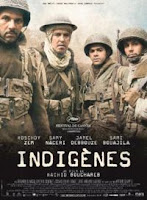Days Of Glory
 Days of Glory is one of the the main films I was looking forward to as part of the festival and I'm glad to say it did not disappoint.
Days of Glory is one of the the main films I was looking forward to as part of the festival and I'm glad to say it did not disappoint.Set during the second half of World War 2 and the slow but steady liberation of France, Alsace was essential to the victory of the allies.
The film surrounds the First French Army, recruited in Africa in order to avoid German eyes and the Vichy authorities: over 200,000 men, including 130,000 “indigenes” (natives) including 110,000 North Africans, and 20,000 “pieds- noirs” (French colonials) and one third young Frenchmen who fled the occupation.
The story is a sad and forgotten story of the soldiers known as “Indigènes” and follows the story of four of them: Abdelkader, Saïd, Messaoud and Yassir, a mobile corps, reputed for their endurance, ground sense , and courage in close combat, each one in pursuit of a different objective throughout the passage across France which they are in part responsible for her liberation.
The first half of the film relates to how the four men end up in the same corps and the racism they encounter along the way from the French despite them doing the same job and for a mother country they have never seen. It also allows for substantial character development and the audience can closely identify with each characters positive and negative personality traits.
The battle scenes are well crafted and carried out and you get a real sense of the horror of warfare both on and off the field as the Indigenes are sent in as fodder before the First French Army.
The second half of the film deals with the four men as they hold and defend a small town in Alsace against the German army. There is a real sense of danger translated off the screen thanks to great direction and importantly fantastic acting and some of the best non-dialogue "eye-acting" I have seen which sucks the viewer in to their plight.
What is really horrific is the statement at the end of the film. In the early 1960s, after decolonization was completed, France then decided to freeze the pensions of veterans of the African Army. In 1996, a Senegalese ex-Staff Sergeant, Amadou Diop, sued the French government. After serving in the army from 1937 to 1959, he was dismissed after Senegal became independent and only received a third of the pension he was entitled to. In 2001, the Council of State ruled in his favour posthumously but in 2003 the French government put a new freeze on the pensions.
French president Jacques Chirac announced last September after seeing the film that he would reverse a 47-year-old policy of freezing war pensions for the widows of expatriate African Army soldiers that fought for France. Chirac's proclamation affects 80,000 people at $140 million annually.
Although this film was a one-off event at the Belfast Film Festival it has a run in the QFT at the end of the month and I highly recommend going to see it.
I would give this film 9.1 French town liberations out of 10
Labels: Film





















2 Comments:
Sounds like a really good film. If you're up for watching it again when it's repeated give me a shout. That goes for anyone else too :D
Great film and one i would definately watch again.
Post a Comment
<< Home